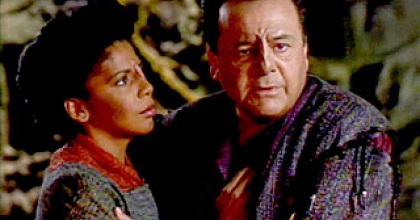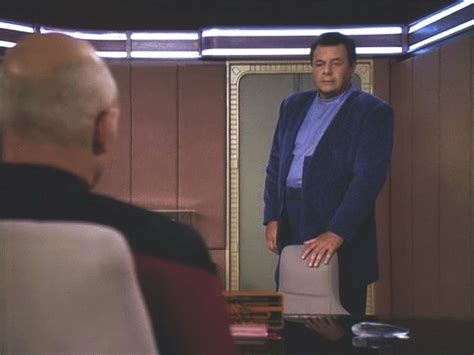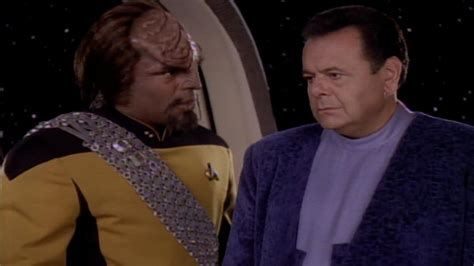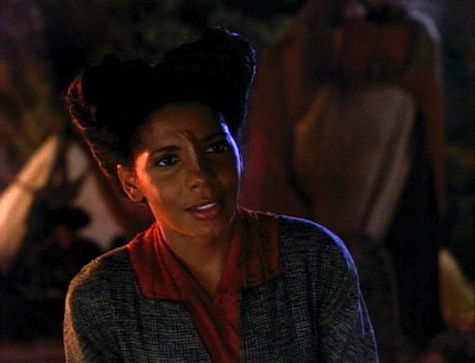|
home | what's new | other sites | contact | about |
||
|
Word Gems exploring self-realization, sacred personhood, and full humanity
Dobara and Nikolai
Wikipedia: "Homeward" is the 165th episode of the American science fiction television series Star Trek: The Next Generation. It is the 13th episode of the show's seventh season. Set in the 24th century, the series follows the adventures of the Starfleet crew of the Federation starship Enterprise-D. In this episode, Lt. Worf, the Klingon Chief of Security of the Federation Starfleet Starship USS Enterprise, must work with his human brother Nikolai Rozhenko, a Federation anthropologist, to save a small group of natives from a primitive alien culture on a dying planet. Plot The Enterprise receives an emergency distress call from Rozhenko, currently posted to Boraal II, a class M planet in the process of suffering an atmospheric catastrophe. The Federation observation post is found to be deserted, but force field shielding has been set up nearby which protects a series of caverns. Enterprise Captain Jean-Luc Picard decides to send an away team to investigate. Concerned for his brother, Worf volunteers, and Picard orders him to go alone and be surgically altered to pass as a Boraalan. Worf transports to the planet and discovers that his brother set up the shield to protect the local villagers. Rozhenko meets with the ship’s senior officers and describes his plan to save one village of the doomed planet by setting up a concealed artificial biosphere. Picard replies that the Federation Prime Directive prohibits interference with the natural development of the Boraalan civilization; it is not for them to decide that one group shall survive while the rest of the planet perishes. After witnessing the atmospheric dissipation extinction event transpire, the crew is puzzled by an unexpected power drain, the origin of which Worf tracks to the Holodeck. His brother has transported the population of the Boraalan village aboard the ship, using the Holodeck to replicate caverns identical to those on the planet, misleading the villagers into thinking they are still on Boraal II. Rozhenko tells Worf and Picard that he believes offering the Boraalan culture a chance of survival is more important than following the Prime Directive. He champions his updated plan of transporting the Boraalans to a new home on a different planet. Picard reluctantly authorizes the plan and orders Chief Medical Officer Dr. Beverly Crusher and Operations Officer Lt. Commander Data to find a new home planet for the Boraalans. Crusher and Data choose Vacca VI as the new Boraalan home world, but it is almost two days away at maximum warp. Ship’s Chief Engineer Lt. Commander Geordi La Forge tells Picard and Rozhenko that the Holodeck program may not run that long. Rozhenko volunteers to return to the Boraalans and help account for any anomalies in the program. A mistrustful Picard orders Worf to accompany him. Returning to the Holodeck, Nikolai and Worf tell the Boraalans that they will lead them to a new home. As they travel, Worf and Rozhenko nearly come to blows when Worf learns that his brother has impregnated one of the villagers, and Nikolai tells Worf that he intends to remain with the Boraalans. Vorin, the village chronicler, finds his way out of the Holodeck and suffers severe culture shock at the reality of the world outside. Enterprise Counsellor Deanna Troi and Picard try to help him adjust, offering him the choice of returning to his people or staying on the ship. Ultimately Vorin cannot live with what he has discovered and commits ritual suicide. The Enterprise arrives at the new Boraalan home, and the Boraalans are beamed down to the eventual site of their new village. Worf and Nikolai make peace when Worf accepts that the Boraalan race would not have survived if not for his brother's unconventional methods. Nikolai assuages Worf by telling him that he is going to stay with the villagers and become the new village chronicler. Aboard the Enterprise, Picard muses with Crusher that while their plan for the Boraalans worked out well, he is disappointed that Vorin was not able to bridge the gap between their two cultures.
Kairissi. I will tell you flat out that this story deeply troubles me. Elenchus. We find here a futuristic techno-man marrying a primitive stone-age woman; but, despite this mismatch of cultures, this is not why we’ve included the story of Dobara and Nikolai in the PM roster. K. Why don't you start, Elenchus? Tell us what you like about the "Homeward" episode. E. I like Nikolai Rozhenko. He is highly principled and will defend his sense of right-and-wrong against the strongest of adversaries. K. And I like Dobara, too. She may not be highly educated, but her womanly spirit of tenderness and kindness warms us like a fire on a cold night. E. What's really odd about this STNG episode is that Picard and those who support him philosophically are the ones we tend to admire. Usually, they represent the best humanity has to offer in terms of intellect, service-mindedness, duty, and honor. K. But in this episode, all of that virtue is set against a stone-age society led by a free-thinker, and the Enterprise crew does not compare well. We're left with a queasy feeling and must ask, "Who are the real primitives here?" E. Why don't you crystallize the real issue before us? K. The vaunted Prime Directive was codified as Federation law ostensibly to protect the rights of primitive societies encountered in the galaxy. Fair enough. A technologically-advanced civilization should not impose itself upon the natural evolutionary course of a lesser developed one. People need to learn their own lessons. We destroy the butterfly by helping it out of the cocoon. All this is good law. But the situation with the Boraalans is entirely different. E. Their planet is about to be destroyed – and they with it. K. Now it strikes me as a special kind of obtuseness to cite the Prime Directive (PD) as justification for allowing all Boraalans to die. The PD was designed to preserve and protect primitive alien societies – this is the original legislative intent of the precept – and yet the Enterprise upper-management would argue that the PD is violated by preserving and protecting a primitive alien society about to suffer planet-wide catastrophe leading to extinction of an entire species of humanoids. E. Granted, doomsday for the Boraalans is just hours away. There's not much time. The Enterprise is but one ship. Not all intelligent life, hardly any, on the planet, to say nothing of the lower animal-forms, could be saved. However, a few hundred might be spared annihilation. The Enterprise has the ability to do that, to repatriate these few to a new “class M planet.” And yet such rescue effort is deemed to be immoral, something unsavory, unprofessional, by Picard and company.
K. All this takes us very close to what’s truly bothering me about this incident. But I think it gets even worse. Here’s the general unfolding. Nikolai Rozhenko represents an enlightened view. He’s not operating according to some remote and summary-judgment legal code. He’s making his decision to help the Boraalans based on his “internal guidance system,” his inner “soul energies,” reflecting a “made in the image” sensibility. E. But Picard and others, including Worf, formulate their conclusions as a function of external legal rubric, some distant authority pontificating in the abstract, without reference to any specific needs of the case at hand. K. I would suggest that we carefully listen to the arguments made. Nikolai is condemned by Picard and Worf as one violating Federation law. They say he’s selfish, he’s thinking only of himself, he's a menace, he’s a renegade creating trouble. E. We are stunned by this upside-down evaluation. Nikolai is saving these people, and his own wife, from certain death – and yet the Enterprise legalists brand him a threat to Federation society. K. Picard’s first attack on Nikolai was to declare his career in Starfleet to be over – as if career, rank, and one’s pension were the major issues in play, and not the lives of the Boraalans. E. They also try to say that Nikolai is self-serving, just a trouble-maker for “the rest of us,” someone who could never follow orders. K. I’d like to think that the scriptwriters of this episode were purposefully leading us to understand the inner-workings of cultish thinking. E. This was written in 1994 when things were still fairly sane, but look at what’s happened since. K. Think of the kind of insane arguments made today to justify atrocity, totalitarianism, and the suppression of traditional American freedoms, such as free speech. Think of the personal attacks, the venom, the apoplexy – of the sort that Nikolai received – and for what? -- for protecting the innocent, those who cannot save themselves. E. We would do well to recall the teachings of Krishnamurti in this regard. When some modern day Nikolia stands up for the vulnerable and innocent – such as the protection of the lives of the unborn – attackers will say that this is a threat to society, a health issue, a dangerous infringement of constitutional liberties, a product of a mean-spirited mind, on and on – just as Picard and company reviled Nikolai. K. The issue comes down to this. What is the source of one’s judgment, one’s sense of right-and-wrong? Is it, like an appeal to the Prime Directive, some external authority, some agenda of a favorite Dear Leader, some dark mandate of a straw-god secured from a "holy book," some imagined pillar of moral code designed to serve the few at the expense of the weak and innocent, some cloaked "reason behind the reason" of the ego intent upon power-and-control? We could go on with this autopsy. E. Or do one’s actions reflect a sacred “inner guidance system,” one’s “true self” energies linked to God?
K. It’s interesting that -- initially, at least, until he came to his senses – Dobara’s appeal to Worf left him unmoved. She tried to tell him that she carried Nikolai’s unborn baby, and that he would be “uncle” to the child.
K. However, with a spirit of legalism gripping him, one of ignoring the “inner guidance system” and focusing on the Federation as Dear Leader, none of that family and humanistic outreach made a difference to Worf. In that moment, his sister-in-law meant nothing to him, the coming child meant nothing to him. And, for the same reason, those of misguided mind today, those who carry out the orders of some external authority, also blind themselves to a trampling of human rights, human dignity, human worth. E. They will deny this as they hide behind a "mask of piety" -- there is always the declaration of faux moral high-ground -- but, if they could look carefully at what they’re doing, they would see that the so-called “freedom” they promote comes at the expense of another group in society; often, the most vulnerable and innocent. K. If I may, I'd like to close this discussion with a somber thought: Any time we make decisions based on some external legal code, some directive of Dear Leader in any form -- be it political, religious, corporate, materialistic science, or any other power structure -- we shut down our natural internal guidance system, we mute the "inner still small voice" of godly sentiment. And, when we do, we open ourselves to the possibility of committing any atrocity -- and feeling justified and smug about it -- any heartless act, any brutality, that's ever been put forward in history. Under this banner of insanity, the world robotically marches toward chaos and perdition, its self-manufactured undoing.
|
||
|
|




